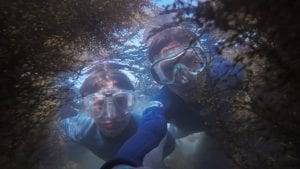
If you’re an advanced scuba diver and have yet to take your rescue diver course, now’s the perfect time to change that. After reaching the level of Advanced Open Water diver, you may be wondering what your next big challenge could be, and this is it. The Rescue Diver Course isn’t just challenging though. It’s also a rewarding and fun experience that many advanced divers consider to be their absolute favorite course.
So, if you’re looking to continue your diving education, grow your confidence as a diver, and want to help others in the process, then consider getting your Rescue Diver Certification with a certified SCUBA instructor.
The rescue diver certification is part of the advanced scuba diver courses and is obtained by divers who have proven their diving skills are developed enough to help others in need of assistance. The rescue scuba diver course teaches divers different techniques to avoid and manage problems in the water with confidence. Once you’ve completed the course, you’ll be able to identify potential hurdles, perform dive emergency protocols, and provide first aid and rescue methods to those in need.
Some of the topics included in the rescue diver course include:
This class focuses on preparing you to be able to help yourself in the water, your buddy and fellow divers under and above the water if troubles arise. Eventually, in your diving career, you will need to perform a rescue. It could be as simple as a tired diver tow or reminding someone to inflate their BCD on the surface. This course will build habits so that when the time arises, you know what to do and how to do it to help the other diver and protect yourself in the process. You will also learn some invaluable self-rescue techniques and refresh your basic dive skills.
The key to a successful rescue course is developing your confidence as a diver. It will significantly help you in a difficult or stressful situation.

Rescues, as previously mentioned, sometimes involve giving a small amount of help to a diver that provides a big impact to their safety and comfort. Sometimes, however, divers will panic and not respond to instructions. It is our instinct to try to help someone in need but without proper training, it is possible to put yourself in harm's way and get yourself hurt while you are trying to provide aid to another diver. The Rescue Course will cover basically every scenario you may come across and teach you different ways to defensively help the other diver and get you both to safety.
The course starts with self-rescue techniques, reminding you how to remove cramps on yourself and the importance of becoming positively buoyant on the surface, for instance. We then focus on rescues from shore or the boat when it is not necessary to enter the water to help. We will then go on a dive and show you ways to deal with distress and panic underwater. Lastly, we deal with the worst-case scenario, finding a diver unconscious and not breathing underwater. It is a rigorous, exciting, and truly rewarding course. Parts of it will challenge you. Parts of it will remind you of things you've forgotten from previous courses.
Once everything in diving has become a habit to you, you’re ready to start your rescue diver certification. These habits include regularly checking your air and no decompression time without being reminded, and effortless buoyancy that you don’t have to give much thought to. Your pre-dive checks also need to be all habit and thoughtful.
Once you’ve developed confidence as a diver and have solid experience under your belt, you can enroll in the rescue diver course, I promise you won’t regret it!
Everyone should take the Open Water, Advanced Open Water, and Rescue Course. We go over some rescue techniques in the Open Water class but all of the skills covered in the Rescue Diver course cannot be covered in the OW and AOW courses. Kids, adults, men, women, people who dive once a year, and people who dive every week should all be trained in rescue not just for safety purposes, but for peace of mind as well.
Eventually, you will use your rescue skills, even if it isn’t in a dive setting. But, the more often you dive, the more often you will use the skills. It is imperative that you're trained to do them properly so as not to hurt yourself or do further harm to the other diver.
You may start the Rescue Diver Course immediately after completing an Advanced Open Water certification or as an Open Water certified diver with 40 logged dives.
Interested in expanding your dive abilities? Then connect with John at Dreaming Sea Divers today to get your rescue scuba diver certification! As a certified SDI and PADI Instructor with thousands of recorded dives on his record, John is beyond passionate about helping others develop and embrace their love for diving. He emphasizes the importance of safety and fun in his courses and is always willing to help a diver improve their skills.
See how John can help you become a better diver today!